Description
Key ingredients and their benefits BAIDYANATH DASHMULARISHT:
Dasamoolarishtam (Dashmularishta) BAIDYANATH DASHMULARISHT Benefits, Uses & Dosage
Dasamoolarishtam (also spelled as Dashmularishta or Dashmoolarishta) is an ayurvedic liquid medicine used as health tonic and pain reliever. It contains 3 to 7% self-generating alcohol because it is prepared through the fermentation of herbs.
It provides vitality and reduces weakness. It is also very beneficial for women disorders and helps women to keep optimum health. In women, it is commonly used after delivery for the prevention of postpartum problems including infectious diseases of uterus, bladder and kidneys, backache, fatigue, pain of perineal area, excess discharge, Postpartum depression, sluggish uterus, swollen breasts etc.
It also provides strength to muscles, bones and ligaments and improves immunity. Due to this reason, it becomes famous for women in India and it becomes a common remedy for postpartum problems.
INGREDIENTS BAIDYANATH DASHMULARISHT
Dashmool (Ten roots) are combination of 10 herbs. These 10 roots are main ingredients of Dasamoolarishtam (Dashmularishta). Here is its list.
| Scientific Name | Common Name |
| Aegle marmelos | Bilva root (golden apple tree) |
| Premna integrifolia | Agnimantha root |
| Oroxylum indicum | Shyonaka root |
| Stereospermym suaveolens | Patala root |
| Gmelina arborea | Kashmari/Gambhari root |
| Solanum indicum | Brihati root |
| Solanum xanthocarpum | Kantakari root |
| Desmodium gangeticum | Shalaparni root |
| Uraria picta | Prishnaparni root |
| Tribulus terrestris | Gokshura root |
Dasamoolarishtam (Dashmoolarishta) contains following other ingredients in addition to water, honey, jaggery (gur).
| Scientific Name | Common Name |
| Plumbago zeylanica | Chitrak |
| Inula racemosa | Pushkaramula |
| Symplocos racemosa | Lodhra |
| Tinospora cordifolia | Giloy/Guduchi |
| Emblica Officinalis | Amla (Indian Gooseberry) |
| Fagonia cretica | Dhamasa/Duralabha |
| Acacia catechu | Khadira |
| Pterocarpus marsupium | Vijayasar |
| Terminalia chebula | Hareetki |
| Saussurea lappa | Kuth/Kushta |
| Rubia cordifolia | Manjishta |
| Cedrus deodara | Deodar |
| Embelia ribes | Vidanga (False Black Pepper) |
| Glycyrrhiza Glabra | Mulethi (Yashtimadhu) – Licorice |
| Clerodendrum serratum | Bharangi |
| Feronia limonia | Kaith/katha/Kapitha |
| Terminalia bellirica | Bhibitaki (behra) |
| Boerhavia diffusa | Punarnava |
| Piper retrofractum | Chavya |
| Nordostachys jatamansi – spikenard | Jatamansi |
| Callicarpa macrophylla | Priyangu |
| Hemidesmus indicus | Sariva |
| Bunium persicum | Kala jeera (black cumin) |
| Operculina turpethum | Trivrit |
| Vitex negundo | Nirgundi |
| Pluchea lanceolata | Rasna |
| Piper longum | Pippali (long pepper) |
| Areca catechu | Puga (Betel nut) |
| Hedychium spicatum | Shati |
| Curcuma longa | Haldi (Turmeric) |
| Foeniculum vulgare | Saunf (Fennel Seeds) |
| Prunus cerasoides | Padmaka |
| Mesua ferrea | Nagkesar |
| Cyperus rotundus | Mustak (Nut grass) |
| Holarrhena antidysenterica | Indrayava |
| Pistacia integerrima | kakar singhi/ Karkatashringi |
| Pueraria tuberosa | Jivaka |
| Microstylis wallichii | Rishabhaka |
| Polygonatum cirrhifolium | Meda |
| Asparagus racemosus | Shatavari |
| Withania somnifera | Ashwangandha |
| Dioscorea bulbifera | Zimikand |
| Vitis Vinifera | Draksha (Raisins) |
| Woodfordia fruticosa | Dhataki |
| Piper cubeba | Kabab-chini/Kankola (Cubeb pepper) |
| Coleus vettiveroides | Jala |
| Santalum album | Chandan |
| Myristica fragrans | Jatiphala (nutmeg) |
| Syzygium aromaticum | Laung (Clove) |
| Cinnamomum zeylanicum | Dalchini (Cinnamon) |
| Elettaria cardamomum | Ela (cardamom) |
| Cinnamomum tamala | Tejpatta |
| Strychnos potatorum | Nirmali/KatakaPhal |
MEDICINAL PROPERTIES
Dasamoolarishtam (Dashmoolarishta) has following healing properties.
- Anti-inflammatory
- Anti-arthritic
- Carminative
- Digestive Stimulant
- Haematinic (increases hemoglobin levels)
- Hematogenic (helps in formation of red blood cells)
- Mild natural Analgesic
- Muscle relaxant
- Mild anthelmintic (due to vidanga)
- Antioxidant
- Antibacterial
- Adaptogenic
- Anti-stress
- Antidepressant
THERAPEUTIC INDICATIONS BAIDYANATH DASHMULARISHT
Dasamoolarishtam (Dashmularishta) is helpful in following health conditions.
Women Health
- Dysmenorrhea (menstrual cramps)
- Recurrent miscarriage
- Pelvic inflammatory disease
- Backache
- Uterus sluggishness
- Perineal pain
- Swollen breasts
- For prevention of uterine infections and Postpartum complications
- Postpartum fatigue
- Postpartum appetite loss
- Postpartum depression (baby blues) along with Brahmi (Bacopa monnieri)
- Postpartum weakness
- Anemia after pregnancy
Brain & Nerves
- Neuralgia
- Sciatica
Muscle, Bones & Joints
- Muscle spasm
- Low backache
- Rheumatoid arthritis
Digestive Health
- Loss of appetite
- Indigestion
- Gas
- Irritable bowel syndrome (IBS) – rarely used
- Jaundice
- Piles
Lungs & Airways
- Persistent cough (VATAJ KASH)
Men’s Health
- Male infertility due to pus in seminal fluid
BAIDYANATH DASHMULARISHT USES & BENEFITS
Dasamoolarishtam (Dashmoolarishta) is beneficial in all above diseases. According to ayurveda, it pacifies VATA and provides strength to the body. It also detoxifies uterus and removes toxins. Therefore, it is generally used immediately after delivery. Now, we discuss about some important medicinal uses and benefits of Dasamoolarishtam.
Use of Dasamoolarishtam in Postpartum period
In ayurveda, Dasamoolarishtam is an important medicine used in the management of all postpartum complications. Its regular use after delivery has following benefits.
- Loss of appetite: In most cases, loss of appetite and indigestion occur after delivery. Due to its digestive stimulant property, Dashmularishta improves appetite and helps treating indigestion in postpartum period.
- Postpartum Fever: Some women also suffer from fever, which can be low-grade and high grade. Dasamoolarishtam is beneficial in both types. In acute fever, Dashmularishta helps fighting off infectious microbes and decreases the intensity of symptoms such as restlessness, headache, discharges, pain, etc. Please note patient may require other medicines to fight off the infection. Nowadays, antibiotics are used. In ancient India, dasamoolarishtam and madhurantak vati, praval pishti were only available options.
- Postpartum diarrhoea and IBS: However, it is very rare, but some women develop diarrhoea or IBS after delivery. In such condition, Dasamoolarishtam alone can help due to its mild astringent action.
- Physical weakness: Dasamoolarishtam contains some herbs, which provides vitality and improves physical strength. After a huge physical exhaustion during the delivery, it provides relief from pain, physical stress and supports joints, muscles and ligaments.
- Low backache after delivery: Many women have low backache after delivery. In some cases, back stiffness is also associated. In such condition, Dasamoolarishtam along with Ashwagandha extract is more beneficial.
- Improves Immunity: Dashmoolarishta also improves immunity due to presence of some immunomodulator herbs. If it is started immediately after delivery, it reduces about 90% health problems that may occur in postpartum period or thereafter.
Recurrent Miscarriage
According to ayurveda, recurrent miscarriage occurs due to inability of uterus to implant the embryo properly. It occurs due to weakness of uterine muscles. Many doctors and patients experience there is no visible or reportable cause of recurrent miscarriages in many women. All reports are normal. In such case, the above cause is most appropriate. In such case, the following combination with Dasamoolarishtam helps well.
| Ayurvedic Remedy | Dosage (Twice Daily) |
| Dasamoolarishtam | 20 ml or 4 tsp. with water |
| Ashwagandha Powder | 2 grams with milk |
| Putrajeevak Seeds | 1 gram |
| Shivlingi Seeds | 1 gram |
Note: The above formulation includes Ashwagandha Powder, which can increase weight in some women. It is very good for lean women. However, taking Ashwagandha is very important to cure recurrent miscarriage. If you already overweight, then you can decrease its quantity to 500 mg twice a day.
Physical debility due to chronic Irritable bowel syndrome (IBS)
However, Dasamoolarishtam is not a potent medicine for IBS, but it improves appetite, reduces bloating and provides strength to the body. Many patients with IBS experience weakness. In such condition, Dashmularishta is more beneficial.
Male infertility due to pus in seminal fluid
Men having pus in seminal fluid can take advantages from the Dasamoolarishtam. Triphala is another remedy of this condition. For more beneficial results, both one should use both together. In chronic and obstinate cases, Rajat Bhasma becomes essential. It is prepared from the silver metal.
| Ayurvedic Remedy | Dosage (Twice Daily) |
| Dasamoolarishtam | 20 ml or 4 tsp. with water |
| Triphala Powder | 3 grams after meal |
Persistent cough
Dasamoolarishtam is useful in cases of persistent cough in which dry cough attacks occur and it subsides after a few sputum expulsions. In ayurveda, this type of cough is called as VATAJ KASHA. In such condition, Dashmoolarishta should be given in dosage of 10 ml after every 2 hours until the cough subsides completely.
Osteoporosis
According to ayurveda, Osteoporosis occurs due to excess VATA and VATA aggravation in the bones. Dasamoolarishtam is drug of choice for VATA aggravation. Therefore, it is beneficial in Osteoporosis, but patient also require other medicines including Laxadi Guggulu and other calcium and mineral supplements.
BAIDYANATH DASHMULARISHT DOSAGE
| Dasamoolarishtam | 20 ml or 4 tsp. with equal amount of water immediately after meal |
The maximum daily dosage of Dashmoolarishta is 60 ml.
CAUTION & SIDE EFFECTS
Dasamoolarishtam is POSSIBLY SAFE & WELL-TOLERATED in most people. There are no side effects reported with it. It is also POSSIBLY SAFE in breastfeeding because it increases breast milk supply.
Contraindications
However, Dashmularishta has some contraindications and if it is used in such conditions, it may worsen the problem. Here are its contraindications.
- Mouth ulcer
- Burning sensation in abdomen
- Heartburn
- Excessive thirst
- Diarrhea with burning sensation
In all above symptoms, you should not use Dashmoolarishta. In such cases, the best alternative is Jeerakarishtam. It provides almost similar benefits in people with these symptoms.
FAQS ABOUT BAIDYANATH DASHMULARISHT
Does BAIDYANATH DASHMULARISHT have an expiry?
According to ancient literature, all types of Arishta and Asava including Dashmularishta are best when they are old and do not have any expiry. However, nowadays, the expiry date is mentioned on many Arishta and Asava formulations, which can vary from 5 to 10 years.
Can prolonged use of BAIDYANATH DASHMULARISHT cause damage to the liver?
No, Dashmoolarishta does not cause any liver damage. It is a safe formulation for the liver. Actually, most of its ingredients are likely to improve the liver functions.
How long can we take BAIDYANATH DASHMULARISHT?
There is no specified duration for the use of BAIDYANATH DASHMULARISHT. Generally, minimum recommended duration of treatment with it is about 3 to 6 months. It is also safe to use for a longer duration under the supervision of an ayurvedic physician.
SOURCE: AYURTIMES





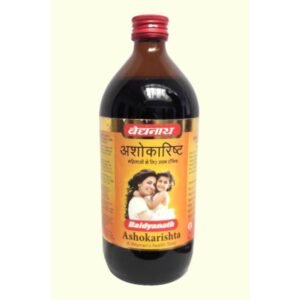
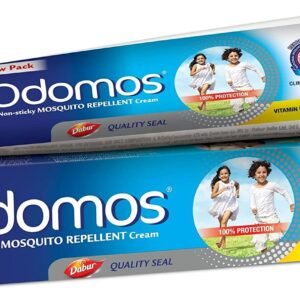
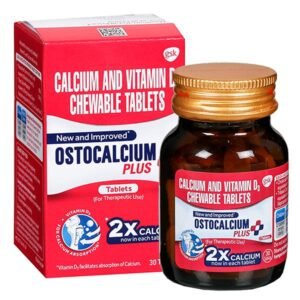
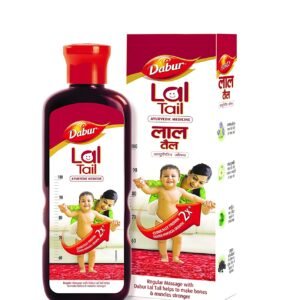
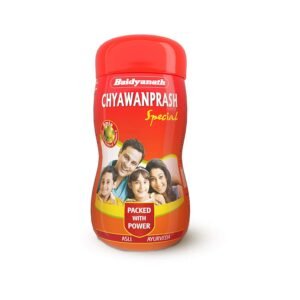
Reviews
There are no reviews yet.